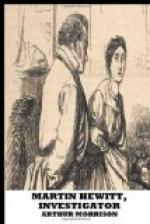“Just before you returned from your holiday I noticed a young man at Luzatti’s whom I remembered to have seen somewhere about the offices in this building. He was tall, young, and so on, but I had a client with me, and was unable to examine him more narrowly; indeed, as I was not exactly engaged on the case, and as there are several tall young men about, I took little trouble. But to-day, finding the same young man with a vacant seat opposite him, I took the opportunity of making a closer acquaintance.”
“You certainly managed to draw him out.”
“Oh, yes; the easiest person in the world to draw out is a cyclist. The easiest cyclist to draw out is, of course, the novice, but the next easiest is the veteran. When you see a healthy, well-trained-looking man, who, nevertheless, has a slight stoop in the shoulders, and, maybe, a medal on his watch-guard, it is always a safe card to try him first with a little cycle-racing talk. I soon brought Mr. Mason out of his shell, read his name on his medal, and had a chance of observing his teeth—indeed, he spoke of them himself. Now, as I observed just now, there are several tall, athletic young men about, and also there are several men who have lost teeth. But now I saw that this tall and athletic young man had lost exactly two teeth—one from the lower jaw, just to the left of the center, and another from the upper jaw, farther still toward the left! Trivialities, pointing in the same direction, became important considerations. More, his teeth were irregular throughout, and, as nearly as I could remember it, looked remarkably like this little plaster mold of mine.”
He produced from his pocket an irregular lump of plaster, about three inches long. On one side of this appeared in relief the likeness of two irregular rows of six or eight teeth, minus one in each row, where a deep gap was seen, in the position spoken of by my friend. He proceeded:
“This was enough at least to set me after this young man. But he gave me the greatest chance of all when he turned and left his apple (eaten unpeeled, remember!—another important triviality) on his plate. I’m afraid I wasn’t at all polite, and I ran the risk of arousing his suspicions, but I couldn’t resist the temptation to steal it. I did, as you saw, and here it is.”
He brought the apple from his coat-pocket. One bitten side, placed against the upper half of the mold, fitted precisely, a projection of apple filling exactly the deep gap. The other side similarly fitted the lower half.
“There’s no getting behind that, you see,” Hewitt remarked. “Merely observing the man’s teeth was a guide, to some extent, but this is as plain as his signature or his thumb impression. You’ll never find two men bite exactly alike, no matter whether they leave distinct teeth-marks or not. Here, by the by, is Mrs. Clayton’s oil. We’ll take another mold from this apple, and compare them.”




